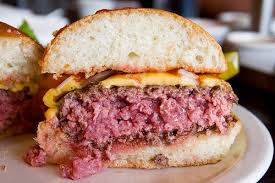 Q – We will be doing a driving trip from coast to coast later this summer. We’re in our mid-sixties, relatively well-traveled, but we’ve not done a driving vacation in the United States. Our biggest concern is all those meals we will have in strange places and we want to stay healthy. How would you suggest we prepare, research, etc? You could say we are E-coli super-conscious. Which restaurants in these small towns and cities are likely to have kitchens that won’t kill us.
Q – We will be doing a driving trip from coast to coast later this summer. We’re in our mid-sixties, relatively well-traveled, but we’ve not done a driving vacation in the United States. Our biggest concern is all those meals we will have in strange places and we want to stay healthy. How would you suggest we prepare, research, etc? You could say we are E-coli super-conscious. Which restaurants in these small towns and cities are likely to have kitchens that won’t kill us.
A – There actually is some research in this area. The first thing to point out is that there is not any medical research to back up the fact that urban dwellers with sophisticated palates live longer than their rural cousins. But you could make a case for obesity and less access to the best medical care influences rural lifespan statistics in some major ways.
As far as E-Coli strains, and there are many, we must point out that fast food chains tend to have the healthiest kitchens. Most of their food arrives frozen and there is very little food handling. This is what we want to emphasize to you in the hope that the information is widely disseminated. The best known fast food chains have expensive equipment that sets off alarms or shuts down when the cooking process is shortened. Undercooked meat and poultry is the major cause of gastrointestinal viruses and food poisoning in travelers. It is virtually impossible to find anything undercooked under the golden arches.
White tablecloth restaurants with a strong local following will usually have a chef who has studied health and hygiene at a recognized culinary school. They take careful steps, though not as careful as the Burger Kings, KFC’s, and Taco Bells of the world.
Your biggest risk is eating at local diners and lower-priced local dining outlets that employ staff that has not been trained in proper food preparation.
The last huge beef recall occurred in April of this year. It involved 1.8 million pounds of beef sold in ten states including Florida, Illinois, Michigan, Pennsylvania, and Ohio. But as the laws now read, the FDA did not have to reveal to consumers exactly what kind of restaurant was getting shipments from Detroit’s Wolverine Packing company. The Department of Agriculture’s Food Safety and Inspection Service does not have to advise consumers that the meat, in this case used in Angus Steak burgers as well as ground beef patties, was shipped to specific restaurants. As you were driving around the country, trying to choose a place to stop for lunch, you would have no way of knowing where you could safely stop for something to eat.
Finally, we advise our clients and our readers to exercise caution when ordering salads on the road. All but the highest category of restaurants depends on bagged salads that have, in the recent past, shown a higher-than-normal propensity to carry food-borne parasites and bacteria.
